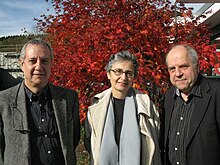Eberhard Knobloch
Eberhard Knobloch (born November 6, 1943 in Görlitz ) is a German historian of mathematics and science .
Life
Knobloch studied classical philology and mathematics at the Free University of Berlin and the Technical University of Berlin from 1962 to 1967 . He passed the state examination as a grammar school teacher and began as a grammar school teacher at the old-language Goethe grammar school (Berlin-Wilmersdorf) before returning to the TU Berlin in 1970 as a research assistant in the field of science history, where he worked with Christoph Scriba in 1972 with a thesis on Leibniz ' Doctorate in combinatorics.
From 1973 he was a mathematics professor at the University of Education in Berlin . In 1976 he completed his habilitation in Berlin and was visiting scholar in Oxford, London and Edinburgh. In 1981 he became professor for the history of science at the TU Berlin (since 2002 academy professor); Retired in 2009. In 1984 he was visiting professor at the Russian Academy of Sciences in Leningrad . Since 1999 he has been a permanent visiting professor at the University of Northwest China . He was also a visiting professor at the École normal supérieure in Paris.
Knobloch dealt, among other things, with Renaissance technology (as with the military engineer Mariano Taccola ), with the notebooks of Leonhard Euler and with Jesuit scientists such as Christoph Clavius .
He was also involved in the new interpretation and decoding of the geographical location information in the geography of Ptolemy by the Berlin geodesist Dieter Lelgemann .
editor
Since 1976 Knobloch has been head of the mathematical parts of the academy edition of Gottfried Wilhelm Leibniz's works (and later also of the technical-scientific parts). In addition to the Leibniz edition, he was also in charge of the Tschirnhaus edition of the Saxon Academy of Sciences and contributed to the Kepler edition. He was also head of the now closed Alexander von Humboldt Research Center at the Berlin-Brandenburg Academy of Sciences. In this function, Knobloch promoted the publication of numerous correspondence from Humboldt.
Awards and memberships in academies
Knobloch is a member of the Académie internationale d'histoire des sciences (corresponding member since 1984, member since 1988, its vice-president from 2001 to 2005 and then its president), since 1996 of the Leopoldina , corresponding member of the Saxon Academy of Sciences , member of the Academia Scientarum Europaea and since 1997 the Berlin-Brandenburg Academy of Sciences . From 2001 to 2005 he was President of the German National Committee for the History of Science. In 2006 he became President of the European Society for the History of Sciences. In 2014 he received the Blaise Pascal Medal of the European Academy of Sciences and in 2017 he was awarded the Kenneth O. May Prize .
Fonts
- The mathematical studies of GW Leibniz on combinatorics. Studia Leibnitiana Supplementa, Volume 11, 1973, text volume on this as Volume 16, 1976.
- The beginning of the determinant theory. Leibniz postponed studies on the determinant calculus. Hildesheim 1980, Arbor Scientiarum B, Volume 2.
- with Menso Folkerts , Karin Reich : Measure, number and weight: Mathematics as the key to understanding and dominating the world. 2nd edition Wiesbaden 2001.
Web links
- Literature by and about Eberhard Knobloch in the catalog of the German National Library
- Homepage at the TU Berlin
Individual evidence
- ^ Andreas Kleineberg, Christian Marx, Eberhard Knobloch and Dieter Lelgemann (eds.): Germania and the island of Thule. The decoding of Ptolemy's "Atlas of the Oikumene" . Scientific Book Society, Darmstadt 2010, ISBN 978-3-534-23757-9 .
- ↑ Member entry of Eberhard Knobloch (with picture and CV) at the German Academy of Natural Scientists Leopoldina , accessed on July 15, 2016.
| personal data | |
|---|---|
| SURNAME | Knobloch, Eberhard |
| BRIEF DESCRIPTION | German science and mathematics historian |
| DATE OF BIRTH | November 6, 1943 |
| PLACE OF BIRTH | Goerlitz |
